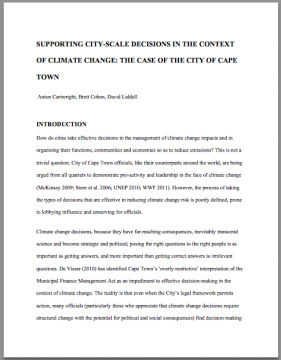Supporting city-scale decisions in the context of climate change: The case of the City of Cape Town


Abstract
How do cities take effective decisions in the management of climate change impacts and in organising their functions, communities and economies so as to reduce emissions? This is not a trivial question. City of Cape Town officials, like their counterparts around the world, are being urged from all quarters to demonstrate pro-activity and leadership in the face of climate change (McKinsey 2009; Stern et al. 2006; UNEP 2010; WWF 2011). However, the process of taking the types of decisions that are effective in reducing climate change risk is poorly defined, prone to lobbying influence and unnerving for officials.
Limiting the biases that arise from personal and circumstantial influences so as to create climate change decisions that are more replicable, defensible and coherent is one of the core aims of a decision support framework. This chapter presents some of the frameworks and tools that are available for decision-making in the context of climate change, and highlights how climate change questions should be structured so as to ensure reasonable outcomes and avoid common errors.
Download
Citation information
This article is a chapter in the book:
Cartwright, A., Oelofse, G., Parnell, S., and Ward, S. (2012) Climate change at the city scale: impacts, adaptation and mitigation in Cape Town. Earthscan, London.
See book contents page
(0) Comments
There is no content